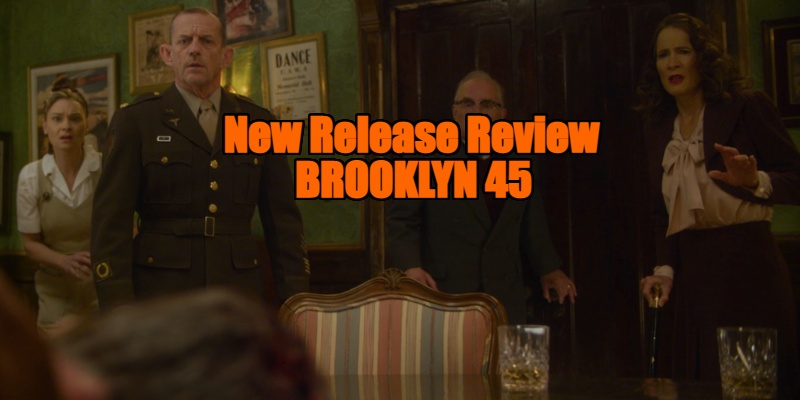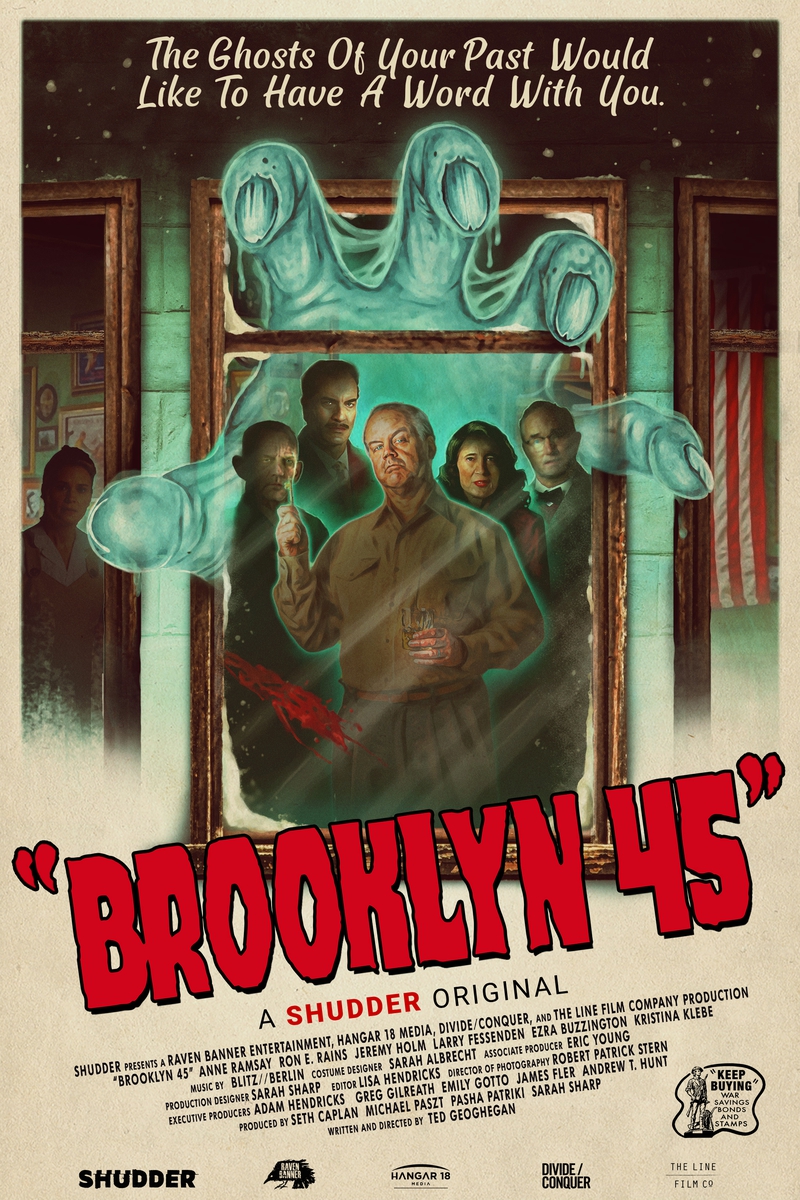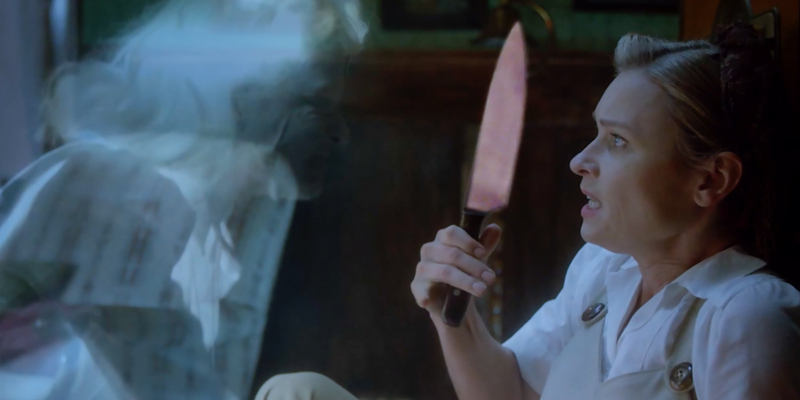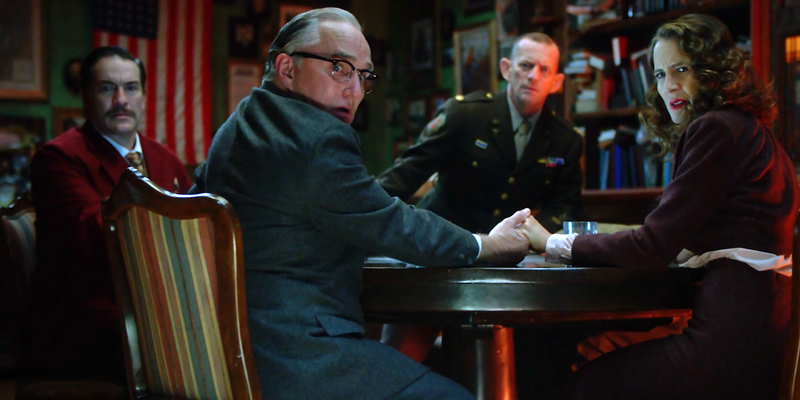
Review by
Eric Hillis
Directed by: Ted Geoghegan
Starring: Anne Ramsay, Ron E. Rains, Jeremy Holm, Larry Fessenden, Ezra Buzzington,
Kristina Klebe

The title Brooklyn 45 might conjure up nightmarish images
of a documentary about Williamsburg hipsters and their record
collections, but fear not, the 45 refers not to 7" vinyl but to the year
1945. Writer/director Ted Geoghegan's single location chiller
takes place in December of that year, with the world beginning to adjust
to a post-war era filled with hope but haunted by ghosts, some
metaphorical, some metaphysical, as we learn here.
Grieving over his wife's suicide, Lt. Col. Clive Hockstatter (Larry Fessenden) gathers several of his military buddies at his Brooklyn brownstone
home. Marla (Anne Ramsay), who earned a reputation as a ruthless
interrogator during the conflict, arrives with her new husband, "pencil
pusher" Bob (Ron E. Rains). Joining them are the hawkish Major
Paul DiFranco (Ezra Buzzington) and the openly gay Major
Archibald Stanton (Jeremy Holm), currently facing charges of
having committed war crimes, which he strenuously denies.

The group find a very troubled Hockstatter, two bottles deep when they
arrive, mumbling about how he let down his late wife by not believing
her claims that the German family in their neighbourhood were Nazi
secret agents. Hockstatter needs to know if there is life after death,
and so ropes his guests into joining him in a séance. His supernatural
queries are answered in the positive when a spectral apparition appears,
which he believes represents his wife. Ready to join her, he blows his
brains out. As if that wasn't enough for his friends to deal with, a
German woman, Hildegard (Kristina Klebe), emerges from a closet,
having been drugged and bound by Hockstatter days earlier.
What follows is a sort of cross between an Evil Dead era
horror movie and the sort of moral dilemma dramas that were so popular
in 1950s Hollywood. Remarkably, Geoghegan manages to combine these two
very disparate genres in a very natural fashion. We're pulled into the
human drama, but we're never jolted out of it when the supernatural
elements kick in.

In the manner of 12 Angry Men, Brooklyn 45 presents us with a group of people
bickering over the guilt/innocence of another party, in this case
Hildegard. Is she really a Nazi spy or simply a greengrocer's daughter
who came to the US with her family seeking a better life, as she claims?
Initially the divide is evenly split, with the two majors presuming her
guilty and blaming her for provoking their friends' suicides, while
Marla and Bob believe the woman's story. Of course, we bring our own
political biases to the table, but the element of Nazism lends an
uncomfortable ambiguity. If Brooklyn 45 were set today and
Hildegard was a Muslim, or if it were set in the '70s and she was
Vietnamese, there would be no doubt that she's innocent, but a filmmaker
might be willing to portray a German woman as a Nazi, which keeps us
guessing throughout as to her level of innocence. It's a clever
subversion of the traditional setup of the sort of liberal Hollywood
dramas to which Brooklyn 45 owes such a debt, and Klebe
plays the pivotal part in a manner that makes it difficult to figure out
if she's telling the truth or simply trying to worm her way out of
trouble.
Geoghegan initially presents us with a group of characters that seem
stereotypical, almost cartoonish. With his carved from granite face,
Holm evokes Bruce Campbell, and as we watch him smile at an American
flag when he enters his friend's home, it's hard not to laugh at such an
over the top portrait of blind patriotism. In his buttoned up uniform,
DiFranco resembles the hawkish, narrow-minded villains of everything
from Clark Gable in Run Silent, Run Deep to Jack Nicholson
in A Few Good Men, all snarling rage and xenophobia. As the drama unfolds, these
characters become more three dimensional as their patriotic mascara
begins to run and secrets are exposed.

Geoghegan's ensemble are a well-drilled unit, delivering performances
that draw on the sort of larger than life acting style that was popular
in the mid 20th century before the likes of Brando and Dean started
mumbling their way to stardom. Yet the performances never feel parodic,
rather respectful of a lost era of drama with a capital D. Save for some
moments of gore, Brooklyn 45 takes most of its visual cues
from classic Hollywood as Geoghegan and cinematographer
Robert Patrick Stern shun the washed out look of modern dark
dramas in favour of a refreshingly bright presentation that reminds us
primary colours aren't anathema to disturbing subject matter.
American cinema has been unwilling to criticise America's actions in
WWII, and it's generally been portrayed as a black and white, good vs
evil conflict. Kudos to Geoghegan for daring to go against the grain and
suggest that Americans may have been every bit as bigoted as the Germans
they fought.


